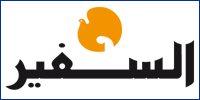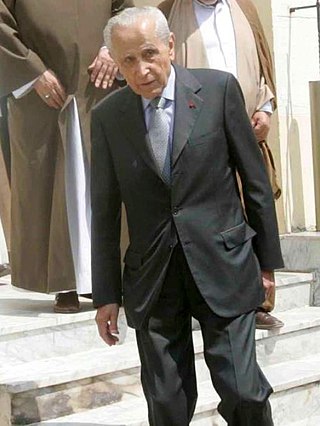Bassel Fleihan was a Lebanese legislator and minister of economy and trade. He died from injuries sustained when a massive bomb exploded on the Beirut seafront as he passed by in former Lebanese prime minister Rafik Hariri's motorcade on 14 February 2005.
Samir Kassir was a Lebanese-Palestinian journalist of An-Nahar and professor of history at Saint-Joseph University, who was an advocate of democracy and prominent opponent of the Syrian occupation of Lebanon. He was assassinated in 2005 as part of a series of assassinations of anti-Syria Lebanese political figures such as Rafic Hariri and George Hawi.

An-Nahar is a leading Arabic-language daily newspaper published in Lebanon. In the 1980s, An-Nahar was described by the New York Times and Time Magazine as the newspaper of record for the entire Arab world.

Since 2004, a series of bombings and assassinations have struck Lebanon, most of them occurring in and around the capital, Beirut. This wave of bombings began with the assassination attempt on Marwan Hamadeh, then peaked with the assassination of former Prime Minister Rafic Hariri on 14 February 2005, which touched off the Cedar Revolution and the withdrawal of Syrian troops. After the massive protests sparked by Hariri's killing, several more bombings hit Lebanon.

Gebran Ghassan Tueni was a Lebanese politician and the former editor and publisher of daily paper An Nahar, established by his grandfather, also named Gebran Tueni, in 1933. He was assassinated in 2005 as part of a series of assassinations of Syria's critics in Lebanon.

As-Safir, was a leading Arabic-language daily newspaper in Lebanon. The headquarters of the daily was in Beirut. It was in circulation from March 1974 until December 2016. The last issue of the paper was published on 31 December 2016. The online version was also closed on the same date.

Al-Balad officially Sada Al-Balad was an Arabic-language daily newspaper in Lebanon. It was headquartered in Beirut and was published as a tabloid commercial paper.

Ounsi el-Hajj was a Lebanese poet, journalist, and translator.

Ghassan Tueni was a Lebanese journalist, politician and diplomat who headed An Nahar, one of the Arab world's leading newspapers. Some call him "The Dean of Lebanese Journalism".

The Arab Democratic Party (ADP) is a Lebanese political party, based in Tripoli, in the North Lebanon Governorate. Its current leader is Rifaat Eid.

Abdel Latif El Zein was a Lebanese politician who served as Member of Parliament from 1960 until 2018. He was the longest-serving member of parliament in the world. He previously held the position of Minister of Agriculture.
Philippe Ziade was a pioneer Lebanese journalist.

The Bab al-Tabbaneh–Jabal Mohsen conflict was a recurring conflict between the Sunni Muslim residents of the Bab-al-Tabbaneh neighbourhood and the Alawite residents of the Jabal Mohsen neighbourhood of Tripoli, Lebanon from 1976 through 2015. Residents of the two neighbourhoods became rivals during the Lebanese Civil War and frequently engaged in violence. Residents were divided along sectarian lines and by their opposition to or support of the Alawite-led Syrian government. Violence flared up during the Syrian Civil War spillover in Lebanon.

General elections were held in Lebanon on 6 May 2018. Although originally scheduled for 2013, the election was postponed three times in 2013, 2014 and 2017 under various pretexts, including the security situation, the failure of the Parliament to elect a new President, and the technical requirements of holding an election. A new electoral law adopted in 2017 provides a proportional representation system for the first time.

Between 2011 and 2017, fighting from the Syrian civil war spilled over into Lebanon as opponents and supporters of the Syrian Arab Republic traveled to Lebanon to fight and attack each other on Lebanese soil. The Syrian conflict stoked a resurgence of sectarian violence in Lebanon, with many of Lebanon's Sunni Muslims supporting the rebels in Syria, while many of Lebanon's Shi'a Muslims supporting the Ba'athist government of Bashar Al-Assad, whose Alawite minority is usually described as a heterodox offshoot of Shi'ism. Killings, unrest and sectarian kidnappings across Lebanon resulted.
The Ministry of Information is the ministry responsible for the distribution of information in Lebanon.

The June 2013 Sidon clash in June 2013 was part of the Syrian civil war spillover in Lebanon, and involved the Lebanese Army and Sunni militants in the city of Sidon, Lebanon. Clashes between the followers of militant preacher Ahmed al-Assir resulted in the deaths of 18 soldiers, 25–40 al-Assir gunmen, two civilians, and according to some sources, four Hezbollah fighters. The clashes were the deadliest since the Syria-related internal conflict in Lebanon began in 2011.

Since the first protests during the Arab Spring in 2011, the Syrian civil war has been both a proxy war for the major Middle Eastern powers, Turkey and Iran, and a potential launching point for a wider regional war. Fears of the latter were realized when the Islamic State, a Salafi Jihadist militant group and alleged former al-Qaeda affiliate, established itself in Syria in 2013, and later combined with the war in Iraq (2013–2017) into a single conflict the following year.

The April 2015 Qalamoun incident was a series of attacks made on targets in Qalamoun region of Syria on the morning on 25 April 2015. The targets were the Brigade 155 and Brigade 65 bases in the Qalamoun. Two weapons convoys were also targeted, reportedly killing one person. According to an opposition source, the targets were Hezbollah camps and ammo storages within the two bases. Several explosions were heard in the areas of Kteife, Yabrud and a village in Qalamoun. Plumes of smoke were seen above the Brigade 65 base, shortly after the strikes.













